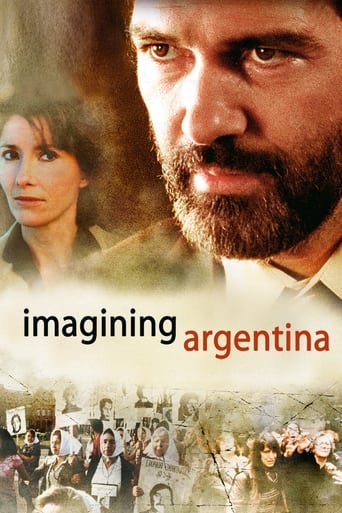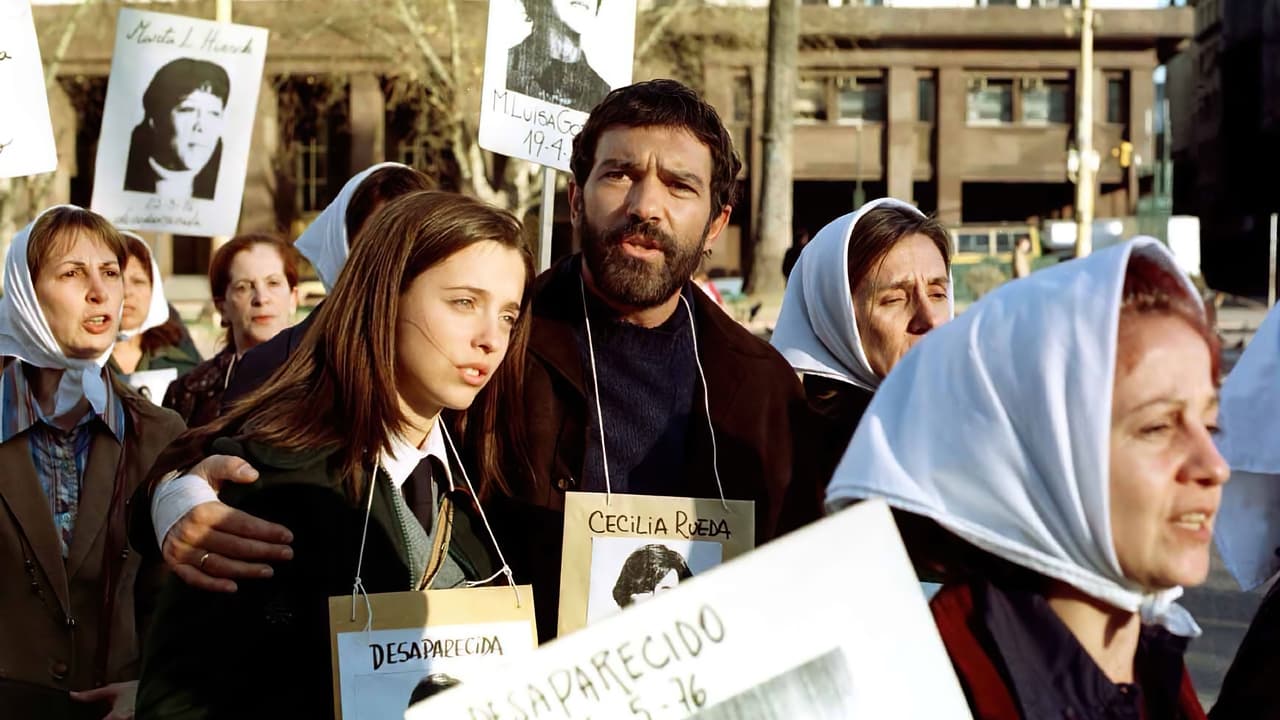maungde
Another impressive work of Antonia Bandaras. This movie shows how a dictator government in Argentina turns the country into a government with the largest debt in the whole world.In developing parts of the world, in Argentinians believe in paranormal psychics, and they believe in them, which is very much the same thing in Burma too. I watched it on TV and missed the beginning. So I even thought this movies is about Burma.Excellent and leaves heart felt visualization of Argentina and Burma (now officially Myanmar). Except about the raping, almost all the things happening in this movie are still the TRUE and PRESENT stories of today's Myanmar.When can God bless Burma with our self gov
jimmylee-1
So, I'm not the best at keeping up with current events. I have a job that I spent most of my time at to keep from being laid off. Local newspaper information about other countries and governments tends to be skimpy and colored by what the newspaper thinks we're interested in seeing.I am eternally grateful to live where I do, but it's only through books like "House of Spirits" and "Bitter Winds" that I really hear about other regimes.Because I spend a lot of time at a job that isn't exactly relaxing, I'm not hot on movies that are stressful. Classic musicals, comedies, and movies that have big names or get a lot of buzz are movies I'm likely to see. If this move had been made in Spanish and lacked Thompson and Banderas, I wouldn't have seen it. If that means the movie wasn't true to Argentina as some of the reviewers have indicated, well, at least the story reached one more person this way.Maybe the story had some holes in it (OK, the ESP thing was a little far fetched), but the overall impression of the method used to administer "political" power in a oppressive regime will never leave me. (And the movie reminded me why isolating armaments to a military group is a really bad idea.) Several comments from the reviewers were incredibly moving, made me appreciate all the more that I live where I do, and made me very glad that I did see this movie.
jotix100
We read the original text by Lawrence Thornton when it was published in this country and liked it for what it dared to present. Not having seen the film, as we don't think it was ever released commercially in this country, or maybe it was just seen in a few markets, we recently caught up with it via the DVD version. Coming, as it did, to the screen adapted by an English playwright, Christopher Hampton, we were expecting much more than what we see on the screen. The novel is worth reading for anyone interested in the tragedy that was perpetuated in Argentina, in which the people in power decided to eliminate, gradually, all those that opposed the military regime, or as in the case of the story at hand, innocent people that had brains to realize the atrocities that were being committed by the brutal people in power.The main problem with the film is the tone that Mr. Hampton decided to give his adaptation. The metaphysical powers of Carlos Rueda occupy center This film could have improved with an all Spanish cast instead of the mixture of acting styles and accents in the finished product. Casting a bearded Antonio Banderas, as Carlos, was perhaps, the wrong choice. Mr. Banderas, whose career in America has been in mostly action movies, is not effective as the man who sees into the crimes that are being committed, including those against his wife, Cecilia, and his daughter, Teresa, but is helpless to do anything to help them.A heavily accented Emma Thompson is seen as Cecilia, who sees her world shattered when they take her away and is tortured by those savages that kept her. Ruben Blades has nothing to do in the film, as his presence doesn't add anything to the story. Ditto for Maria Canals, who plays Esme, the loyal friend. Leticia Dolera appears as Carlos and Cecilia's daughter Teresa, who like her mother, is taken away as a lesson for the father, who has dared to ask about their whereabouts and has protested publicly.The only thing the film serves is to remind us about those totalitarian governments that have brought to power dictators like the ones that wrecked havoc in Argentina against people they thought were in their way.
gradyharp
Argentina's Dirty War and the regime of the Generals from 1976 to 1983 is one of the dark secrets of history and has been examined by poets, writers such as Colm Toibin (and here, Lawrence Thornton in his novel from which the film was adapted), and journalists. And yet the silence about this period of time is deafening, especially since the amnesty this past June releasing the perpetrators from all responsibility of this terrifying activity and time in Argentina. Now, with the current 'silencing' of our own covert CIA activities and tortures in the name of a fight against terrorism, this overlooked film takes on particular potency. And for whatever reasons the film doesn't succeed as a great movie, at least it is a red flag bravely waving.In 1976 the intellects, professors, journalists and writers began disappearing, kidnapped, taken to secret hideaways, tortured, raped, and disposed of all in the guise of protecting the viability of the military regime. Carlos (Antonio Banderas) runs a children's theater and is married to Cecilia (Emma Thompson) who writes articles about the "desaparecidos" despite the warnings from Carlos and their close friends Silvio (Rubén Blades) and Esme (Maria Canals). Their daughter Teresa (Leticia Dolera) is a young girl who is conflicted about the feelings of her parents in this scandalized government. Cecilia is abducted, becomes one of the dreaded desaparecidos, and Carlos commits himself to finding her. He discovers he has clairvoyant powers and holds meetings in his garden to help parents and loved ones of the desaparecidos to cope. Working with Teresa he tries to envision Cecilia's whereabouts and the film's dénouement and conclusion deal with this breathless seeking.The acting if good as expected from this cast. The direction is fast paced, but the problem is one of distance from the passion of Carlos. For some reason Banderas elected to keep such a low profiles that his desperation to find Cecilia is somewhat muted. But as stated above the real success of this fine little film is the message it carries and that message is too close to home to ignore. The musical score and cinematography (and the incidental wonderful Tango dancing) are superb. Recommended. Grady Harp



 AD
AD


